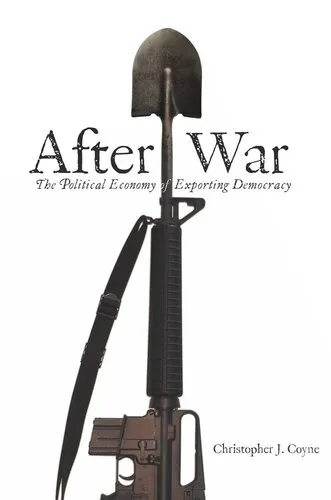After War: The Political Economy of Exporting Democracy
4.5
Reviews from our users

You Can Ask your questions from this book's AI after Login
Each download or ask from book AI costs 2 points. To earn more free points, please visit the Points Guide Page and complete some valuable actions.Related Refrences:
Analytical Summary
Christopher J. Coyne’s *After War: The Political Economy of Exporting Democracy* provides an in-depth, scholarly examination of the complexities that arise when nations attempt to transplant democratic institutions into post-conflict environments. Serving as a critical analysis rooted in political economy, the work dissects the historical record, policy assumptions, and economic constraints that define the process of democratic exportation.
Drawing on case studies and theoretical frameworks, the author scrutinizes whether external interventions can successfully foster long-term political stability, economic growth, and social cohesion. The book bridges disciplines, synthesizing insights from economics, political science, and history to present a multidimensional account of both successes and failures in nation-building efforts.
Coyne argues that the intentions behind exporting democracy often confront structural realities: fragile institutions, cultural divergence, and the inherent limitations of external governance models. By unpacking these layers, he challenges policymakers, scholars, and practitioners to reconsider the efficacy and ethics underpinning interventionist strategies in post-war settings.
Key Takeaways
The book outlines a rigorous set of lessons for understanding the political economy of nation-building, offering a practical and theoretical compass for anyone involved in foreign policy, international aid, or political analysis.
First, the exportation of democracy is far from a straightforward process. Successful implementation hinges on nuanced engagement with local conditions, not merely on replicating institutional frameworks.
Second, economic realities—such as resource allocation, market development, and infrastructure rebuilding—play a decisive role in determining whether democratic ideals take root.
Third, there are unintended consequences to interventionist policies that must be carefully weighed against potential benefits.
Fourth, historical precedents highlight the mixed record of such efforts, suggesting that sustainable democracy depends more on endogenous evolution than exogenous imposition.
Memorable Quotes
"The process of constructing political order is as much about perception and legitimacy as it is about formal institutions." Unknown
"Economic incentives and political realities often collide, reshaping the intended outcomes of democratic exportation." Unknown
Why This Book Matters
*After War: The Political Economy of Exporting Democracy* is not merely a policy critique—it is a clarion call for more refined, contextually aware approaches to global democratic promotion.
In a world where interventionist policies are routinely debated, the book’s analytical depth offers a powerful resource for shaping informed, ethical strategies. It serves academics looking for robust theoretical discourse, practitioners seeking applicable insights, and policymakers confronted with the realities of post-conflict nation-building.
Information unavailable regarding exact publication year, as no reliable public source verified this detail at the time of writing.
Inspiring Conclusion
Through its incisive analysis and multidisciplinary perspective, *After War: The Political Economy of Exporting Democracy* challenges readers to rethink the fundamental assumptions driving foreign interventions. This book is essential reading for anyone committed to building a sustainable, just, and prosperous global order.
If you are an academic, a policy professional, or a curious reader intrigued by the intersection of economics, politics, and ethics, this work will equip you with the frameworks necessary to navigate one of the most pressing challenges of our time. Engage deeply with the arguments, share them with colleagues, and foster constructive dialogue about the future of democratic institution-building worldwide.
Free Direct Download
You Can Download this book after Login
Accessing books through legal platforms and public libraries not only supports the rights of authors and publishers but also contributes to the sustainability of reading culture. Before downloading, please take a moment to consider these options.
Find this book on other platforms:
WorldCat helps you find books in libraries worldwide.
See ratings, reviews, and discussions on Goodreads.
Find and buy rare or used books on AbeBooks.
1175
بازدید4.5
امتیاز50
نظر98%
رضایتReviews:
4.5
Based on 0 users review
"کیفیت چاپ عالی بود، خیلی راضیام"
Questions & Answers
Ask questions about this book or help others by answering
No questions yet. Be the first to ask!


